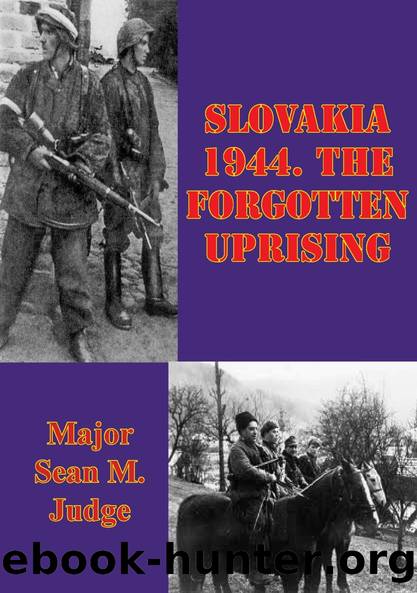Slovakia 1944. The Forgotten Uprising by Major Sean M. Judge

Author:Major Sean M. Judge [Judge, Major Sean M.]
Language: eng
Format: epub
Tags: History, Military, United States, Europe, General, Germany, Special Forces
ISBN: 9781782898023
Google: pZlvCwAAQBAJ
Publisher: Pickle Partners Publishing
Published: 2014-08-15T05:02:11+00:00
Political Obscurity and the Tides of History
The failure of the uprising, in concert with the political climate of the Cold War, colored the historical coverage of this remarkable rebellion. Stanislav Kirschbaum notes the steady subordination of the Slovaks to the Czechs in the late 1940s resulted in the willful distortion, by the Communists in the 1950s, of the objectives and the historical record of the uprising.{138} Divisions existed even among the Communists themselves; the Czechoslovak Communist Party and the CPS vied for post-war power, while the Communist Party of the Soviet Union sought to expand its own international influence. The Czech communists went so far as to accuse many of those Slovak communists involved in the uprising of being "bourgeois elements" and "deviationists," more interested in nationalism than socialism.{139} This competition between these three Communist parties is yet another aspect of the Slovak story that deserves more study. The political thaw that followed the federation of Czechoslovakia in the late 1960s saw the beginning of more accurate coverage of the uprising, only to see it lost again in the subsequent repression after 1968.{140} Alexander Dubcek, the partisan veteran and communist leader, claimed something of an epiphany when he realized "that of the many officially sanctioned books and studies published in the past about the uprising, only a few were more than propaganda."{141} Discerning the full truth about the Slovak National Uprising is extremely difficult, at best, and requires proper consideration of the differing viewpoints and the motivations of each of their protagonists.
Western accounts of World War II have virtually ignored the Slovak National Uprising for a number of reasons. Embarrassment at the treatment of Czechoslovakia with appeasement and the Munich Agreement in 1938, and then failure to hold Germany to that same agreement in March 1939, which led to the creation of bastard Slovakia, has played a role.{142} Additionally, both Britain and the Unites States played only a minor role in the uprising. They were largely bystanders looking in from the outside, powerless to do anything. The British had deliberately limited aid, with their Special Operations Executive restricted to sabotage and guerrilla activities, not major uprisings.{143} The Americans and the British tried to support the uprising with very small, secret military missions that resulted in the capture and execution of 17 of their agents.{144} These covert missions focused their efforts on the Tri Duby airfield near Banska Bystrica and managed to fly out dozens of downed Allied airmen, while flying in military and medical supplies for the insurgents.{145} In a way, the Western countries tried to exonerate themselves by blaming the Soviet Union for prohibiting them from assisting the Slovaks and denying them operational freedom in the area.{146} In truth, US and British priorities were elsewhere. Operation Market Garden's launch and subsequent failure in mid-September 1944, the 20 October 1944 surrender of Aachen, the first large German city to be captured, and the Warsaw uprising all garnered more attention. Since then these efforts have enjoyed extensive coverage in Western media, overshadowing the events in Slovakia.
Download
This site does not store any files on its server. We only index and link to content provided by other sites. Please contact the content providers to delete copyright contents if any and email us, we'll remove relevant links or contents immediately.
The Radium Girls by Kate Moore(12018)
100 Deadly Skills by Clint Emerson(4921)
Rise and Kill First by Ronen Bergman(4779)
The Templars by Dan Jones(4682)
The Doomsday Machine by Daniel Ellsberg(4484)
The Rape of Nanking by Iris Chang(4203)
Killing England by Bill O'Reilly(3995)
Stalin by Stephen Kotkin(3957)
Hitler in Los Angeles by Steven J. Ross(3942)
12 Strong by Doug Stanton(3541)
Hitler's Monsters by Eric Kurlander(3328)
Blood and Sand by Alex Von Tunzelmann(3195)
The Code Book by Simon Singh(3178)
Darkest Hour by Anthony McCarten(3119)
The Art of War Visualized by Jessica Hagy(3000)
Hitler's Flying Saucers: A Guide to German Flying Discs of the Second World War by Stevens Henry(2750)
Babylon's Ark by Lawrence Anthony(2672)
The Second World Wars by Victor Davis Hanson(2521)
Tobruk by Peter Fitzsimons(2508)
